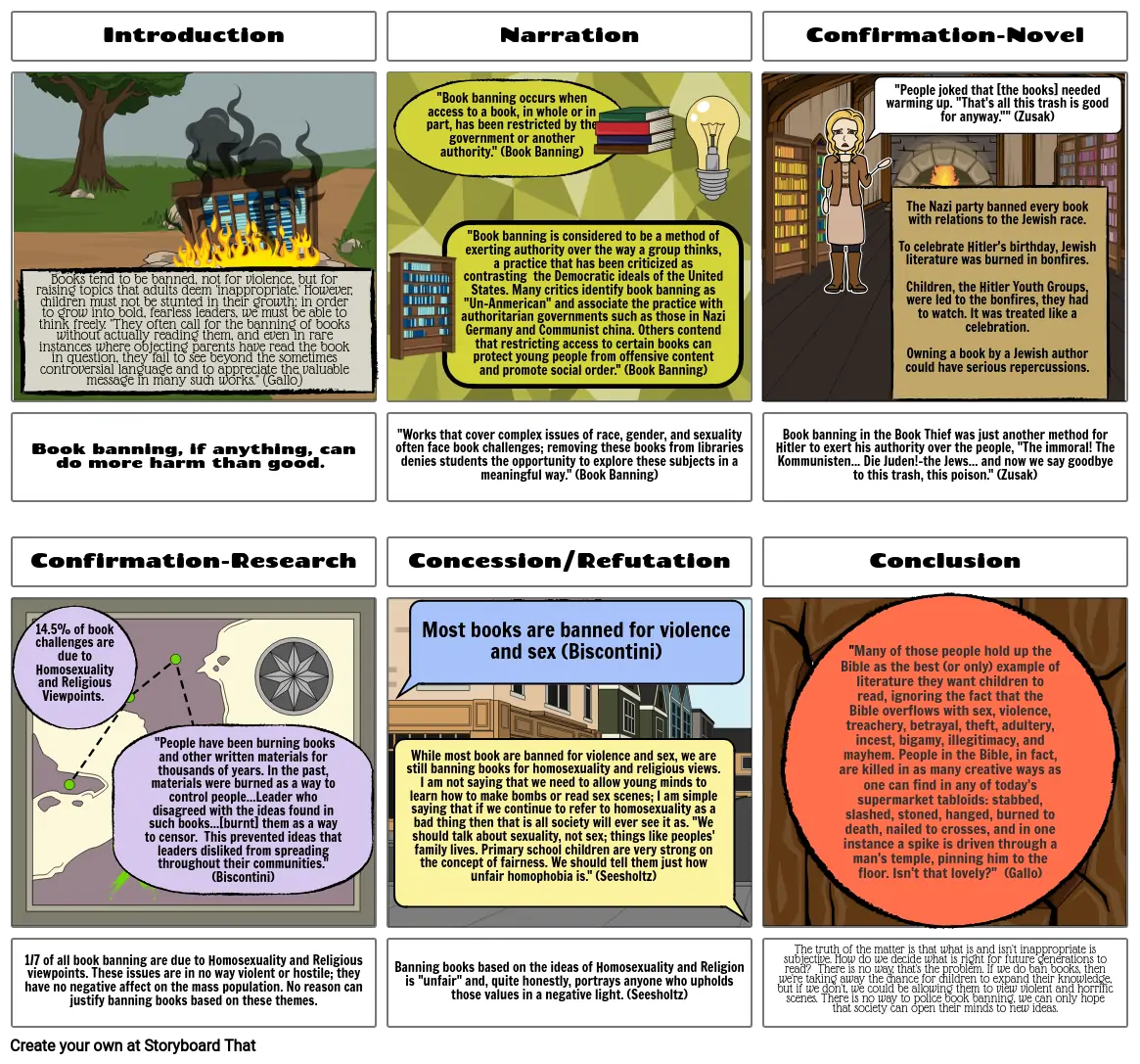Book Banning and The Book Thief

Storyboard Description
Jessica Nicole Jones: 7th Period Honors English
Storyboard Text
- Introduction
- Books tend to be banned, not for violence, but for raising topics that adults deem 'inappropriate.' However, children must not be stunted in their growth; in order to grow into bold, fearless leaders, we must be able to think freely. "They often call for the banning of books without actually reading them, and even in rare instances where objecting parents have read the book in question, they fail to see beyond the sometimes controversial language and to appreciate the valuable message in many such works." (Gallo)
- Narration
- "Book banning occurs when access to a book, in whole or in part, has been restricted by the government or another authority." (Book Banning)
- "Book banning is considered to be a method of exerting authority over the way a group thinks, a practice that has been criticized as contrasting the Democratic ideals of the United States. Many critics identify book banning as "Un-Anmerican" and associate the practice with authoritarian governments such as those in Nazi Germany and Communist china. Others contend that restricting access to certain books can protect young people from offensive content and promote social order." (Book Banning)
- Confirmation-Novel
- "People joked that [the books] needed warming up. "That's all this trash is good for anyway."" (Zusak)
- The Nazi party banned every book with relations to the Jewish race. To celebrate Hitler's birthday, Jewish literature was burned in bonfires. Children, the Hitler Youth Groups, were led to the bonfires, they had to watch. It was treated like a celebration. Owning a book by a Jewish author could have serious repercussions.
- Book banning, if anything, can do more harm than good.
- Confirmation-Research
- 14.5% of book challenges are due to Homosexuality and Religious Viewpoints.
- "Works that cover complex issues of race, gender, and sexuality often face book challenges; removing these books from libraries denies students the opportunity to explore these subjects in a meaningful way." (Book Banning)
- Concession/Refutation
- Most books are banned for violence and sex (Biscontini)
- Book banning in the Book Thief was just another method for Hitler to exert his authority over the people, "The immoral! The Kommunisten... Die Juden!-the Jews... and now we say goodbye to this trash, this poison." (Zusak)
- Conclusion
- "Many of those people hold up the Bible as the best (or only) example of literature they want children to read, ignoring the fact that the Bible overflows with sex, violence, treachery, betrayal, theft, adultery, incest, bigamy, illegitimacy, and mayhem. People in the Bible, in fact, are killed in as many creative ways as one can find in any of today's supermarket tabloids: stabbed, slashed, stoned, hanged, burned to death, nailed to crosses, and in one instance a spike is driven through a man's temple, pinning him to the floor. Isn't that lovely?" (Gallo)
- 1/7 of all book banning are due to Homosexuality and Religious viewpoints. These issues are in no way violent or hostile; they have no negative affect on the mass population. No reason can justify banning books based on these themes.
- "People have been burning books and other written materials for thousands of years. In the past, materials were burned as a way to control people...Leader who disagreed with the ideas found in such books...[burnt] them as a way to censor. This prevented ideas that leaders disliked from spreading throughout their communities." (Biscontini)
- Banning books based on the ideas of Homosexuality and Religion is "unfair" and, quite honestly, portrays anyone who upholds those values in a negative light. (Seesholtz)
- While most book are banned for violence and sex, we are still banning books for homosexuality and religious views. I am not saying that we need to allow young minds to learn how to make bombs or read sex scenes; I am simple saying that if we continue to refer to homosexuality as a bad thing then that is all society will ever see it as. "We should talk about sexuality, not sex; things like peoples' family lives. Primary school children are very strong on the concept of fairness. We should tell them just how unfair homophobia is." (Seesholtz)
- The truth of the matter is that what is and isn't inappropriate is subjective. How do we decide what is right for future generations to read? There is no way, that's the problem. If we do ban books, then we're taking away the chance for children to expand their knowledge, but if we don't, we could be allowing them to view violent and horrific scenes. There is no way to police book banning, we can only hope that society can open their minds to new ideas.
Over 30 Million Storyboards Created

